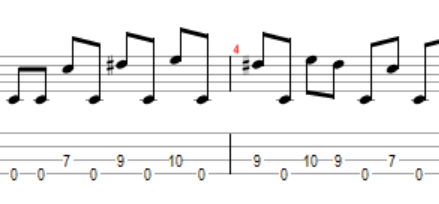This post contains affiliate links
Lately, I`ve seen some discussion on whether playing metal on a jazz bass is a good idea.
One reason for this is that Squier and Fender jazz basses are versatile instruments. Thus, the question arises of whether this versatility is helpful for getting a good metal tone out of it.
I`ve also seen some people be skeptical of the instrument since it`s called a “jazz” bass. However, this was merely a marketing strategy from when the instrument was first released in 1960 and does not mean the bass is only suitable to play jazz.
Thus, after being a metal bassist for 15 years, I decided to write this article to clear up some of the confusion.
I`ll show you whether the jazz bass can be used to play metal, and what the pros and cons of doing so are.
I`ve also added a list of metal bassists that have played a jazz bass, and I`ve outlined the difference between playing metal on a J and a P bass. Lastly, I made a small guide on how to get a good metal tone out of the Jazz bass.
Can you play metal on a jazz bass?
Due to its tonal versatility and narrow string spacing, the Jazz bass is a suitable instrument for most forms of metal music. The jazz bass is a moderately popular instrument within the genre and has been played by bassists in various sub-genres such as thrash, progressive alternative, and symphonic metal.
Not only has the jazz bass been shown to work well for playing metal. It has also stood the test of time in the genre. The J bass has been used in everything from 80`s heavy metal to metalcore and modern-day progressive metal.
You can listen to Martin Mendez`s smooth undistorted bass tone in Opeth. Then, you could listen to the hard-hitting thrash grooves of Greg Christian in Testament. Despite their difference in style, both of these bassists commonly played a jazz bass.
The challenging part is to tailor the sound of the J bass to fit different forms of metal. However, once you get the hang of all the tonal options it offers, you can do almost anything with it.
You can get a growly sound out of the instrument by plucking the strings hard and turning up the tone knob and turning down the neck pickup. This will give you a tone that will add punch to a heavy and hard-hitting metal band.
By turning down the tone knob and turning the neck pickup up, you can also make the Jazz bass sound similar to the P bass. With the help of a distortion pedal, this can give you an old-school metal tone that sits well in a mix.

Metal bands that use a jazz bass
The Jazz Bass has been used by metal bassists for decades, in almost every sub-genre there is.
It is however commonplace for metal bassists to play a range of different basses. This holds especially true when they play in different tunings, and thus need to switch between basses often. Therefore, most metal bass players that play a J bass, also tend to play other basses as well.
Here are some of the bands and metal bassists that use a jazz bass, or have done so throughout their careers:Band: Bass Player: Instrument: Judas Priest Ian Hill Fender Jazz Bass until the mid-80s. A Day To Remember Joshua Woodard (2003-2021) Fender American Deluxe Jazz Bass, Fender Geddy Lee Signature Jazz Bass, various. Opeth Martin Mendez Fender Jazz Bass, Marcus Miller Signature Jazz Bass, various Testament Greg Christian (1983-1996, 2004-2014) Fender Jazz Bass, Fender Geddy Lee Signature Jazz Bass, various Metallica Jason Newstead (1986-2001) Various custom Jazz basses made by Roger Sadowsky when touring with Metallica in 1997 Rage Against The Machine Tim Commerford Fender Jazz Bass, Lakland USA Series 44-60 Jazz Bass, various Megadeth James LoMenzo (2006-2010, Touring member since 2021) Fender Marcus Miller Jazz Bass during Megadeth’s 2007 live shows. Bring Me The Horizon Matt Kean Fender Jazz Bass, Fender American Deluxe Jazz Bass, various Anthrax Frank Bello Fender Frank Bello Signature Bass Guitar, Squier Frank Bello Jazz Bass, Fender Aerodyne Jazz Bass, various Mastodon Troy Sanders Fender American Standard Jazz Bass, various
Jazz bass or P bass for metal
While the Jazz bass is an overall good choice for metal, it differs quite a bit from playing metal on a precision bass
This is because the main difference between the jazz and precision bass lies in their tonal variety. With the J bass, you can customize your tone a good bit. This is great in metal bands with a diverse or experimental sound, or if you play in multiple bands.
Because of this, you can generally rely on solely playing a jazz bass without feeling limited.
The Precision bass has an iconic tone that will sit well on almost any track. However, while this tone is largely beloved, it can`t be customized to the same extent as the J bass.
Some bassists, like the late Chi Cheng of Deftones and Steve Harris of Iron Maiden, have stuck to only playing the P bass in metal. They found a sound that worked well for them and stuck to it. However, most metal bassists that play a precision bass tend to play other basses as well.
Thus, you can play metal bass with solely a P bass, but this will commit you to a tone that might not always fit the overall sound of a band perfectly.
Another thing to note between the two instruments is the difference in neck width. J basses are 38mm (1.5″) thick at the nut, while the P bass is 43mm (1.69″). For younger metal players this can thus make the Jazz bass more comfortable to play.
Riffs that utilize open strings while playing a melody on another string can also feel slightly more cumbersome on the P bass. This is because you have to reach slightly further with your fretting hand when playing metal riffs like this:

Making a Jazz Bass sound good in Metal
Most of my tips on metal bass eq and amp settings can be applied to the Jazz bass as well. Here are some key things you generally want to do to get a metal tone out of a Jazz bass.:
Tone Knob and pickup selection
What the knobs on a bass guitar do differ from bass to bass. On most Jazz basses though, you have a tone knob that controls the treble, and two knobs that control the volume of each pickup.
The tone knob alone gives you a massive amount of options for how to set your tone. To get a good metal tone out of the J bass, my recommendation is to dial it up slightly to about 60% up. This will give you a decent amount of treble, brightness, and punch.
As for blending the pickups, it`s a best practice to use more of the bridge pickup than the neck pickup in metal. The neck pickup on a jazz bass has a dark and smooth sound, whereas the bridge pickup has a bright sound.
As mentioned above, a hard-hitting metal tone usually has a good bit of brightness. A lack of brightness is also often one of the reasons why the bass is hard to hear in metal songs. Thus, using more of the bridge pickup will help you cut through the guitars and be heard.
Personally, I prefer keeping some of the tone of the neck pickup. Thus, setting the bridge pickup at 75% and neck pickup at 25% often strikes a nice balance. Feel free to adjust the blend from there if you find that the tone becomes overly thin, or if it lacks sharpness.
Distortion Pedal
The easiest way to turn your tone from sounding generic to sounding like metal is to use a distortion pedal.
Adding just a slight amount of distortion can make a major difference to both your and your band’s sound. Thus, combined with the vast tonal options the J bass offers, a distortion pedal can help you dial in exactly the type of metal tone you are looking for.
While all distortion pedals are different, the vast majority of them work for getting a decent metal tone. If you don`t currently own a distortion pedal though, my recommendation is the AZOR Heavy metal.
Just like the Jazz bass, this pedal gives you a lot of tonal control with just a few knobs. It has a classic mode that is reminiscent of the distortion you’ll find in 80s metal and an extreme mode that gives you a more modern form of distortion.
Paired with the Jazz bass, this pedal thus gives you enough options to find a tone that will sit well in any metal band.
Fresh Roundwound Strings
A good way of achieving an even brighter and punchier tone is to use fresh roundwound strings on your jazz bass.
After being played for a while, roundwounds have a tendency to start losing their brightness. Thus, the difference between a fresh set of strings, and one that has been played for 3+ months can be night and day in metal.
If you have a set of roundswounds that you have been playing for a while, you can opt to refresh and reuse the strings. This way, you won`t have to buy a new set to get a good metal tone out of your J bass.
If you need a new set of roundwound strings, I recommend this set from Ernie Ball For E standard and Eb standard.
If you plan on tuning lower than Eb, I have written in-depth guides on most alternate bass tunings where I also make string recommendations.
Conclusion
As you can tell by now, the jazz bass is a fitting instrument for metal. It`s versatile enough to work for most sub-genres, and its narrow string spacing at the neck can make it easier for you to tackle some of the best metal bass songs ever.
The possible downside of it is that the tonal options can be overwhelming to a beginner. This is one reason that the P bass can be preferable for beginners, as you can always plug it in and get a good tone. Thus, if you want a bass that’s simple but effective, the j bass can be an unfit choice for metal.
The narrow neck width of the J bass can make it easier to play melodic and fast metal grooves. However, for bassists with large hands, this upside can turn into a downside. Thus, if you have found bass guitars cumbersome to play in the past due to the size of your hands, you could run into the same issue with the jazz bass.
Overall, jazz basses tend to be great both in terms of tone and playability, and I do recommend them for playing metal. The instrument also lets you seamlessly transition between metalcore and old-school heavy metal, and is not an instrument that can be outgrown.
While instrument choice matters, a huge part of sounding like a metal bassist is using the right scales. As this often gets overlooked, I have written a guide on the essential metal bass scales that all metal bass players can benefit from learning.

